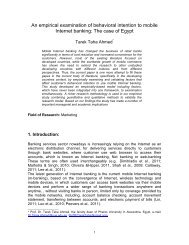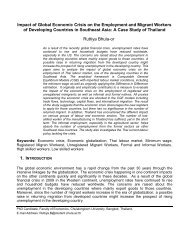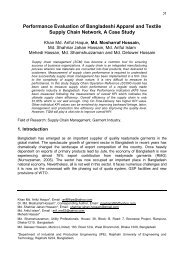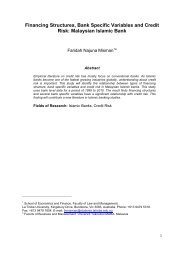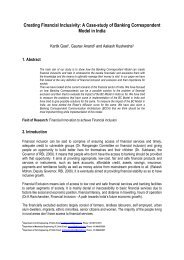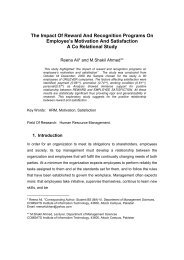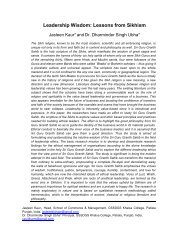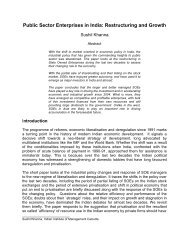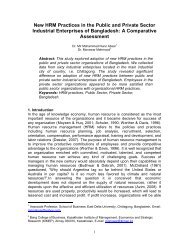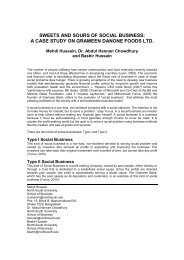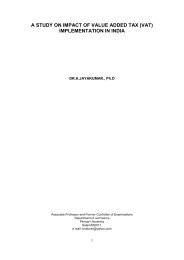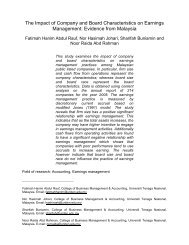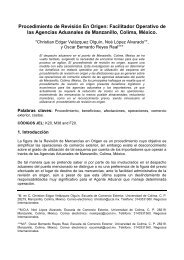Legal Obstacles Facing Islamic Banking in Malaysia
Legal Obstacles Facing Islamic Banking in Malaysia
Legal Obstacles Facing Islamic Banking in Malaysia
Create successful ePaper yourself
Turn your PDF publications into a flip-book with our unique Google optimized e-Paper software.
(gambl<strong>in</strong>g) shall be derived from <strong>Islamic</strong> law; but start<strong>in</strong>g from the basic pr<strong>in</strong>ciples up to thedispute resolution, all the mechanisms should be derived from <strong>Islamic</strong> law.The obstacles fac<strong>in</strong>g <strong>Islamic</strong> bank<strong>in</strong>g can be categorised by its seriousness. Forconvenience the authors have divided them <strong>in</strong>to (1) legislative obstacle; (2) juridicalobstacle; (3) shari’ah governance obstacle; (4) documentation obstacle; and (5) moneylaunder<strong>in</strong>g obstacle. A summary of each of these obstacle are described below:(1) Legislative obstacle: Legislative obstacle basically means that the exist<strong>in</strong>g laws ofthe country that are applicable to <strong>Islamic</strong> bank<strong>in</strong>g are based on Common law andsome of the provisions of these legislations are <strong>in</strong>consistent with <strong>Islamic</strong> law. Thiseventually makes that specific part of the law <strong>in</strong>compatible with <strong>Islamic</strong> bank<strong>in</strong>g. In<strong>Malaysia</strong>, the legal system consist both Common law and <strong>Islamic</strong> law and theFederal Constitution of the country specifies the application of these two types oflaw. All the Federal laws are consistent with Common law and the state laws aremade <strong>in</strong> consistent with <strong>Islamic</strong> law (9 th Schedule of the Federal Constitution of<strong>Malaysia</strong>). As held <strong>in</strong> the case of Bank Islam <strong>Malaysia</strong> Bhd. v Adnan Omar (1994),the laws applicable to <strong>Islamic</strong> bank<strong>in</strong>g are federal laws. Hence, except the <strong>Islamic</strong>bank<strong>in</strong>g Act 1983 and the Takaful Act, the rest of the laws applicable to <strong>Islamic</strong>bank<strong>in</strong>g <strong>in</strong> <strong>Malaysia</strong> are legislations based on Common law before the <strong>in</strong>ception of<strong>Islamic</strong> bank<strong>in</strong>g to the country. Hence, this created obstacles to <strong>Islamic</strong> bank<strong>in</strong>g.This is evident from the case laws decided by the courts <strong>in</strong> <strong>Malaysia</strong>. For example,<strong>in</strong> the case of Bank Islam <strong>Malaysia</strong> Bhd. v Adnan b<strong>in</strong> Omar (1994), there wasdispute over Order 83 of Rules of High Court 1980 <strong>in</strong> which the <strong>in</strong>terest or ribaneeds to be considered which is aga<strong>in</strong>st the pr<strong>in</strong>ciples of <strong>Islamic</strong> commercial law.(2) Juridical obstacle: Juridical obstacle described the challenges faced to <strong>Islamic</strong>bank<strong>in</strong>g <strong>in</strong> <strong>Malaysia</strong> when the courts that decide the <strong>Islamic</strong> bank<strong>in</strong>g cases are notshari’ah courts; but Civil courts <strong>in</strong> which the procedures and the judges hear<strong>in</strong>g thematters would be tra<strong>in</strong>ed <strong>in</strong> Common law; rather than <strong>Islamic</strong> law, which is the lexloci of the <strong>Islamic</strong> law. Hence, it is impossible to try an <strong>Islamic</strong> bank<strong>in</strong>g case andprovide justice to the parties before the court. This is evident from the <strong>Islamic</strong>bank<strong>in</strong>g cases determ<strong>in</strong>ed by the Courts <strong>in</strong> <strong>Malaysia</strong>. Though there is a specialbench created <strong>in</strong> the Civil Courts <strong>in</strong> <strong>Malaysia</strong>, they lack adequate knowledge andqualification to hear <strong>Islamic</strong> bank<strong>in</strong>g matters. Hence, it is vital to tra<strong>in</strong> them andteach them <strong>Islamic</strong> bank<strong>in</strong>g law, which is def<strong>in</strong>itely a technical area of law. The birthand persistence of this problem could be proved by case law. In the case of BankIslam <strong>Malaysia</strong> Bhd. v Adnan b<strong>in</strong> Omar (1994), the judge equated rebate (ibra) tomuqasah which actually is set-off. This proves the ignorance of the civil court judges<strong>in</strong> matters related to <strong>Islamic</strong> bank<strong>in</strong>g and f<strong>in</strong>ance.(3) Shari’ah governance obstacle: shari’ah governance can be described as the <strong>Islamic</strong>version of corporate governance. <strong>Islamic</strong> banks need to have proper governanceprocedure based on <strong>Islamic</strong> law; rather than merely follow<strong>in</strong>g the conventional wayof corporate governance. The tumult <strong>in</strong> shari’ah corporate governance of <strong>Islamic</strong>bank<strong>in</strong>g <strong>in</strong> <strong>Malaysia</strong> now after the enactment of Central Bank of <strong>Malaysia</strong> Act 2009and the new Shari’ah Governance Framework of 2010 is still is that where actuallythe shari’ah Boards of the <strong>Islamic</strong> banks should rank <strong>in</strong> the organization. Shouldthey be below the Board of Directors or are they <strong>in</strong> equal rank<strong>in</strong>g to them? What arethe statutory liabilities of shari’ah scholars sitt<strong>in</strong>g <strong>in</strong> the Shari’ah Advisory Committeeat the Bank Negara (Central Bank of <strong>Malaysia</strong>) level and the Shari’ah scholars



